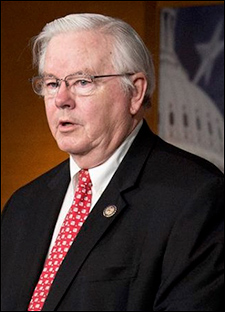Dec. 4, 2017 — Veteran Texas Rep. Joe Barton (R-Ennis), a former Energy & Commerce Committee chairman, has apparently taken the advice he was reportedly receiving from many local Republican leaders and activists advising him not to seek re-election. Barton, recently coming under attack when his nude picture taken during a previous consensual sexual relationship surfaced on Twitter, announced late last week through social media that he will end his 34-year congressional career when the current Congress adjourns.
Barton had already filed to run in 2018, but will now withdraw his paperwork prior to Texas’ Dec. 11 candidate filing deadline. We expect to see several Republicans come forward to run in what will be the first open 6th District contest since 1984. Immediately, Tarrant County Tax Assessor Ron Wright announced that he would enter the newly open Republican primary.
The 6th District performs as a safe Republican seat beginning in the Arlington area of Tarrant County, which is the population anchor, before continuing southeast to annex Ellis and Navarro Counties. President Trump carried the 6th, 54-42 percent, down a bit from Mitt Romney’s 2012 performance of 58-41 percent against President Obama.

